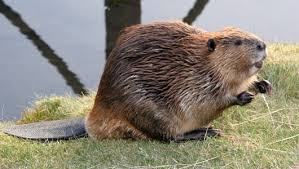beaver
英 [ˈbiː.vər]
美 [ˈbiː.vɚ]
- n. 海狸;海狸皮毛
- n. (Beaver)人名;(英)比弗
使用频率:

记忆方法
在记忆单词“beaver”时,可以将其与“beaver’s dam”结合。想象一只水獭(beaver)在建造水坝(dam),这样就能在脑中形成一个清晰的画面,帮助记忆该单词。
以上内容由AI生成, 仅供参考和借鉴
中文词源
beaver 海狸
来自PIE *bhebhrus, 词根重复构词,来自词根bher, 棕色的,见bear, 熊。
英语词源
- beaver
-
beaver: [OE] Like bear, beaver appears to mean etymologically ‘brown animal’. Old English beofor or befor came from a prehistoric West and North Germanic *bebruz, which in turn went back to an Indo-European *bhebhrús, a derivative of the base *bhru- ‘brown’. Other words for ‘beaver’ from the same source include Czech bobr, Lithuanian bebrùs, and Latin fiber.
- beaver (n.)
- Old English beofor, befer (earlier bebr), from Proto-Germanic *bebruz (cognates: Old Saxon bibar, Old Norse bjorr, Middle Dutch and Dutch bever, Low German bever, Old High German bibar, German Biber), from PIE *bhebhrus, reduplication of root *bher- (3) "brown, bright" (cognates: Lithuanian bebrus, Czech bobr, Welsh befer; see bear (n.) for the likely reason for this). Gynecological sense ("female genitals, especially with a display of pubic hair") is 1927 British slang, transferred from earlier meaning "a bearded man" (1910), from the appearance of split beaver pelts.
权威例句
- 1. Ask young Harry to do it — he's still an eager beaver and wants to impress by his willingness.
- 请年轻的亨利干吧——他仍然是个雄心勃勃的人,并努力使人对他的投入留下深刻印象.
- 2. The hat is made of beaver.
- 这顶帽子是海狸毛皮制的.
- 3. These young people beaver away at school.
- 这些年轻人在学校里用功苦读.
- 4. The beaver is very good.
- 海狸皮是上好的.
- 5. The man is an eager beaver.
- 那人工作很卖力.
